Package Handler: Ensuring Efficient Shipping and Delivery
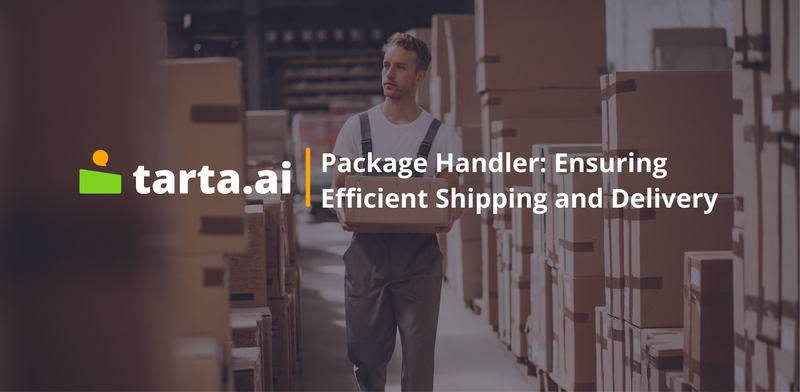
Job description
Package handlers are an integral part of the logistics industry, responsible for processing, sorting, and moving packages and parcels through various stages of the shipping process. They play a crucial role in ensuring that packages are delivered to their destinations on time and in good condition.
Package handlers work for companies such as UPS, FedEx, and DHL. They typically work in warehouses or distribution centers and are involved in every aspect of the shipping process. Package handlers are responsible for loading and unloading trucks, scanning packages, sorting them by destination, and moving them to the appropriate location for shipping.
Requirements
To become a package handler, you typically need a high school diploma or equivalent. Physical stamina is also important, as package handlers need to be able to lift and move packages that can weigh up to 70 pounds. Good communication skills are essential, as package handlers need to be able to communicate effectively with other team members and supervisors. The ability to work in a fast-paced environment and handle repetitive tasks is also important.
Responsibilities
Main Responsibilities | Description |
Loading and unloading trucks | Package handlers are responsible for loading and unloading packages onto and off of trucks, using manual or mechanical equipment such as pallet jacks or forklifts. This involves safely and efficiently moving packages of various sizes and weights, and following proper lifting and handling techniques to prevent injury. |
Scanning packages | Package handlers scan packages using handheld or stationary scanning devices to ensure that they are properly tracked and routed to their destination. This involves accurately recording and updating package information in the organization's tracking system, and identifying and resolving any issues or discrepancies. |
Sorting packages | Package handlers sort packages by destination, using a variety of methods such as conveyor belts, chutes, or manual sorting. This involves quickly and accurately identifying the destination for each package, and organizing them into appropriate groups for efficient shipping. |
Moving packages | Package handlers move packages to the appropriate location for shipping, using conveyors, carts, or other equipment. This involves following safety procedures and guidelines to prevent accidents or damage to packages, and ensuring that packages are properly labeled and secured for shipping. |
Reporting issues or problems with packages | Package handlers report any issues or problems with packages, such as damage, missing items, or incorrect addresses, to supervisors. This involves carefully documenting and communicating package information, and working with other team members to resolve any issues or delays in the shipping process. |
The average age of an employed package handler is 39 years old.
Additional Duties
Packaging: Package handlers may be responsible for packaging items, such as fragile items, to ensure that they are properly protected during shipping.
Cleaning: Package handlers may be responsible for cleaning and maintaining the warehouse or distribution center, ensuring that it is a safe and clean working environment.
Skills
To be a successful package handler, you need a combination of both hard and soft skills. Hard skills are technical abilities and knowledge, while soft skills are personal attributes that enable you to work effectively with others. Here are some hard and soft skills that are essential for a successful package handler:
Hard Skills
- Physical Fitness: Package handlers need to be physically fit and able to lift heavy packages, stand for long periods, and perform repetitive tasks.
- Technical Skills: Package handlers should have knowledge of shipping software, scanners, and other equipment used in the shipping process.
- Time Management: Package handlers must be able to manage their time effectively, ensuring packages are processed and shipped on time.
- Safety Awareness: Package handlers need to have knowledge of safety protocols and be able to identify potential safety hazards in the workplace.
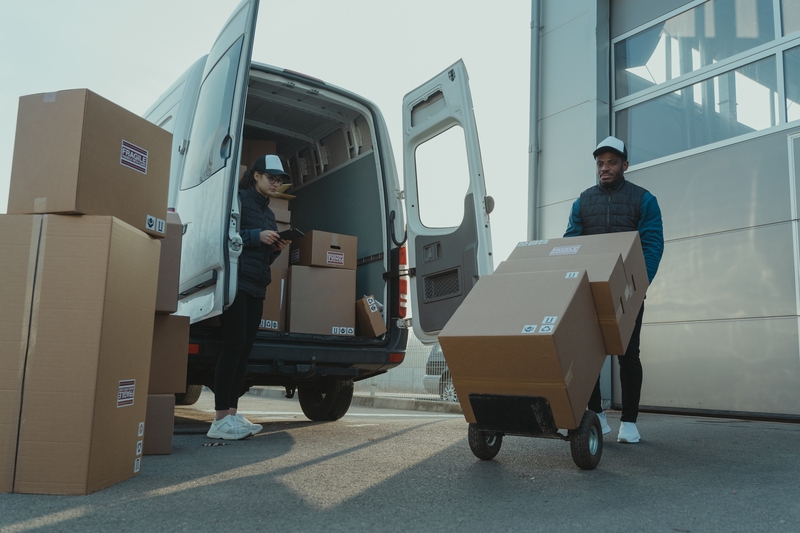
Photo: Tima Miroshnichenko/Pexels
Soft Skills
- Attention to Detail: Package handlers need to be able to pay close attention to detail to ensure that packages are properly scanned, sorted, and shipped.
- Communication Skills: Package handlers need to be able to communicate effectively with other team members and supervisors, reporting any issues or problems.
- Teamwork: Package handlers need to be able to work effectively as part of a team, supporting their colleagues to ensure packages are processed and shipped on time.
- Flexibility: Package handlers need to be able to adapt to changing schedules, workloads, and priorities as needed to meet customer demands.
- Positive Attitude: Package handlers need to have a positive attitude, even when working under pressure, to maintain morale and productivity.
Salary
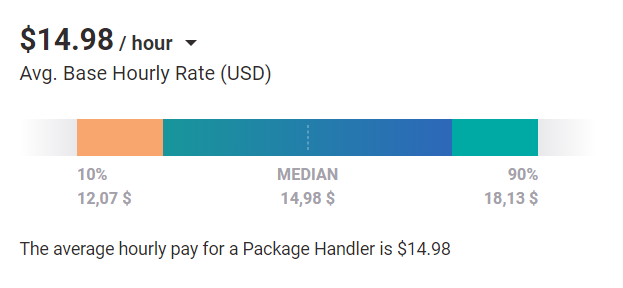
Source: PayScale
According to the Bureau of Labor Statistics, the median annual wage for package handlers was $30,320 as of May 2021, with the highest 10 percent earning more than $46,930 and the lowest 10 percent earning less than $23,560.
According to Payscale, the average hourly wage for a package handler in the United States is $14.98 per hour. This can range from $12 to $18 per hour depending on factors such as company size, geographic location, and experience level. Here is a breakdown of the average hourly wages by experience level:
- Entry-Level (less than 1 year of experience): $12.32 per hour
- Early Career (1-4 years of experience): $13.31 per hour
- Mid-Career (5-9 years of experience): $14.40 per hour
- Experienced (10-19 years of experience): $15.57 per hour
- Late Career (20+ years of experience): $16.55 per hour
It's important to note that these are just averages and individual wages can vary based on the specific employer and other factors.
Factors That Influence Earnings
Factor | Influence on Earnings |
Company Size | Larger companies may offer higher salaries and more opportunities for advancement |
Geographic Location | Package handlers in high-cost-of-living areas may earn more due to increased demand |
Experience Level | Those with more experience typically earn more than entry-level workers |
Additional Skills/Certifications | Gaining additional skills or certifications can make an employee more valuable and lead to higher pay |
Additional Responsibilities | Taking on additional responsibilities such as training new hires or supervising a team can lead to promotions and higher pay |
Ways to Improve Earnings
To improve earnings as a package handler, there are several steps that can be taken. One option is to gain additional skills or certifications that can make an employee more valuable to their employer. For example, becoming certified to operate a forklift or other warehouse equipment can lead to higher pay. Additionally, taking on additional responsibilities such as training new hires or supervising a team can lead to promotions and higher pay.
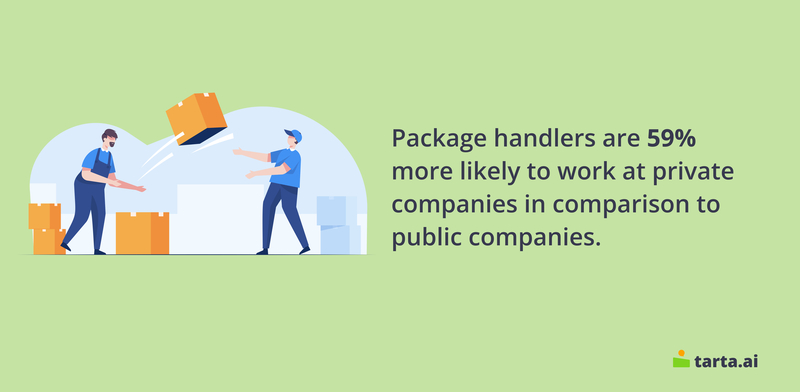
Package handling is a physically demanding job that requires manual labor, and as such, it can be a great workout. On average, package handlers walk several miles each day and lift hundreds of pounds of packages.
Additional Benefits
Benefit/Incentive | Description |
Health Insurance | Provides coverage for medical expenses, including doctor visits, hospital stays, and prescription drugs. |
Allows employees to take time off from work for vacation, sick days, and personal reasons while still receiving pay. | |
Retirement Plans | Helps employees save for retirement through employer contributions and/or matching contributions. |
Tuition Reimbursement/Professional Development | Offers financial assistance to employees pursuing higher education or professional development opportunities. |
Incentive Bonuses | Provides additional pay as a reward for meeting or exceeding performance goals. |
Signing Bonuses | Offers a one-time bonus to new employees upon signing a job offer. |
Overtime Pay | Provides additional pay for working beyond regular working hours, such as evenings, weekends, or holidays. |
Job environment
Package handlers work in a fast-paced, dynamic environment that requires physical strength, mental alertness, and attention to detail. They typically work in warehouses or distribution centers that are designed to efficiently process and move packages through the shipping process. In this article, we will discuss the job environment of a package handler, including the settings, tools, and work schedule.
Settings | Description | Tools | Description |
Warehouses | Large facilities designed to process packages efficiently. | Scanners | Handheld devices used to scan packages and track their progress. |
Loading Docks | Areas where trucks are loaded and unloaded. Can be noisy and busy. | Pallet Jacks | Manual tools used to move packages around the warehouse or distribution center. |
Belts that transport packages to different areas of the warehouse for processing. | Forklifts | Motorized vehicles used to move heavy packages around the warehouse or loading dock. | |
Shipping and Receiving Areas | Areas where packages are sorted, scanned, and prepared for shipping. | Boxes and Packing Materials | Used to prepare packages for shipping, ensuring they are properly protected and labeled. |
|
| Safety Gear | Hard hats, safety glasses, and steel-toed shoes required to protect workers from potential hazards in the workplace. |
Work Schedule
Package handlers typically work full-time or part-time, depending on the needs of the employer. They may work day, evening, or night shifts, depending on the demands of the job. Many package handlers work weekends and holidays, as these are often busy times for shipping and delivery. The work schedule can be physically demanding, requiring long periods of standing, lifting heavy packages, and performing repetitive tasks.
The retail industry is the highest-paying for package handlers.
Education
Warehouse workers and package handlers typically do not require a bachelor's or master's degree to enter the field. However, there are several educational and professional pathways that can help individuals improve their skills and advance their careers in this industry.
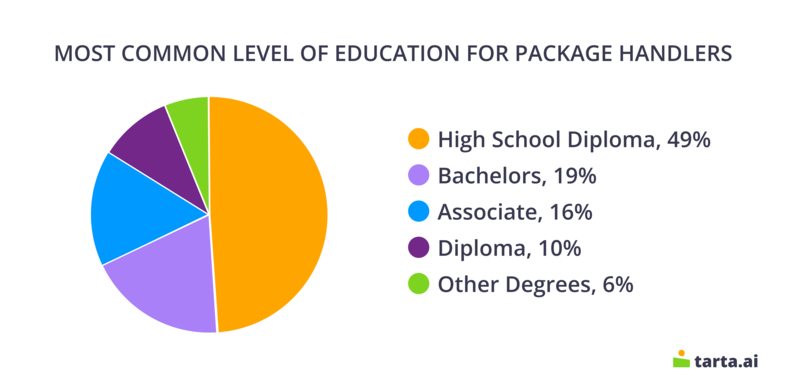
Package handling is generally an entry-level position that does not require formal education beyond a high school diploma or equivalent. However, some employers may prefer or require candidates to have a Bachelor's degree, especially if they are applying for a management or leadership role within the warehouse or distribution center.
Master’s Degree
A master's degree is not typically required for entry-level positions in this field. However, individuals who are interested in upper-level management positions may benefit from a degree in business administration or a related field.
Professional Associations
There are several professional associations for individuals in the supply chain industry, including package handlers. These associations offer networking opportunities, professional development resources, and access to industry news and trends. Some examples of professional associations in this field include the Warehousing Education and Research Council (WERC), the Council of Supply Chain Management Professionals (CSCMP) and the International Warehouse Logistics Association (IWLA) .
Licenses and Certifications
While package handlers do not typically need licenses or certifications, some employers may require them to complete training programs related to workplace safety, equipment operation, or other job-specific skills.
Commercial Driver's License (CDL): If a package handler is required to operate a commercial motor vehicle (CMV) as part of their job duties, they may need to obtain a CDL. This typically involves passing a written knowledge test and a driving skills test. Some employers may also require additional training or certification in areas such as cargo securement or hazardous materials handling.
Hazmat Endorsement: If a package handler is responsible for handling or transporting hazardous materials, they may need to obtain a hazmat endorsement on their CDL. This involves passing a background check and a written test on the safe handling and transportation of hazardous materials.
Occupational Safety and Health Administration (OSHA) Certifications: OSHA offers a variety of certification programs that may be relevant for package handlers, such as the 10-hour or 30-hour General Industry Safety and Health course, which covers topics like hazard recognition, injury prevention, and OSHA regulations.
Equipment-Specific Certifications: Some package handling jobs may require the use of specialized equipment, such as forklifts or pallet jacks. Employers may require operators to be certified in the safe operation of these machines, which typically involves completing a training course and passing a practical skills test.
Career Paths
Package handlers may begin their careers in entry-level positions, but there are many opportunities for career development and advancement within the field. Here are some ways that package handlers can develop their careers:
Ways of Career Development
- Gain experience: Package handlers can gain experience in a variety of settings, including warehouses, distribution centers, and shipping facilities. As they gain experience, they can take on additional responsibilities and advance to higher positions.
- Pursue education and training: While a college degree is not required, taking courses or obtaining certifications related to the field can improve job prospects and increase earning potential. For example, obtaining a forklift operator certification or a logistics certification can be helpful.
- Seek out mentors: Building relationships with experienced professionals in the field can be beneficial for career development. Mentors can provide guidance and advice, as well as help individuals make important connections in the industry.
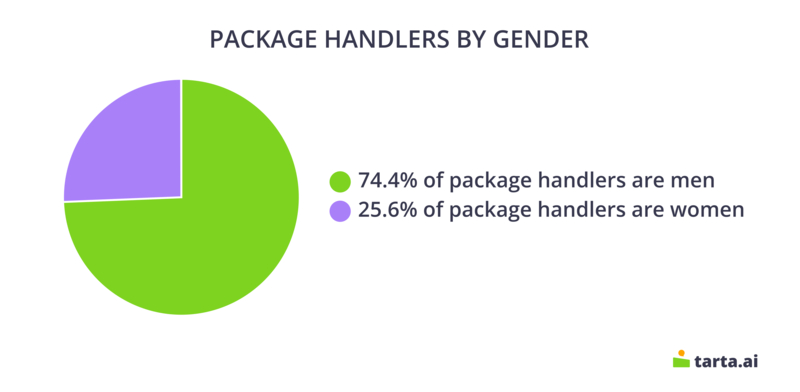
Subfields | Description |
Inventory management | Professionals focus on managing inventory levels and ensuring that products are available when needed. |
Distribution | Professionals focus on managing the distribution of products to customers or retail locations. |
Transportation | Professionals focus on managing the transportation of goods from one location to another. |
Reverse logistics | Professionals focus on managing the return of goods from customers to retailers or manufacturers. |
Procurement | Professionals focus on sourcing materials and products for a company's supply chain. |
Operations management | Professionals focus on managing the overall operations of a supply chain, including inventory, distribution, and transportation. |
Specialization |
|
Hazmat handling | Professionals specialize in handling hazardous materials and must have extensive knowledge of safety protocols for transportation. |
Cold chain logistics | Professionals specialize in handling temperature-sensitive products and must have knowledge of refrigeration systems and transportation methods. |
E-commerce fulfillment | Professionals specialize in fulfilling online orders and must have knowledge of online ordering systems and packaging methods. |
In recent years, advancements in technology have transformed the package handling industry. For example, many facilities now use automated sorting systems and robots to help package handlers sort and transport packages more efficiently.
Alternative Careers and Similar Jobs
Individuals who have experience in package handling may also be qualified for other careers within the logistics and supply chain industry, such as:
- Logistics coordinator: Professionals in this role manage the movement of goods and materials through the supply chain.
- Warehouse manager: Professionals in this role oversee the day-to-day operations of a warehouse, including managing staff and ensuring that products are stored and shipped efficiently.
- Transportation manager: Professionals in this role oversee the transportation of goods and materials, including managing drivers and coordinating delivery schedules.
- Manufacturing: Professionals in manufacturing oversee the production of goods and may have experience with inventory management and logistics.
- Retail: Retailers often have their own warehouses and distribution centers, where package handlers and logistics professionals are needed.
- Delivery services: Package handlers may have transferable skills for careers in delivery services, such as working as a delivery driver or courier.
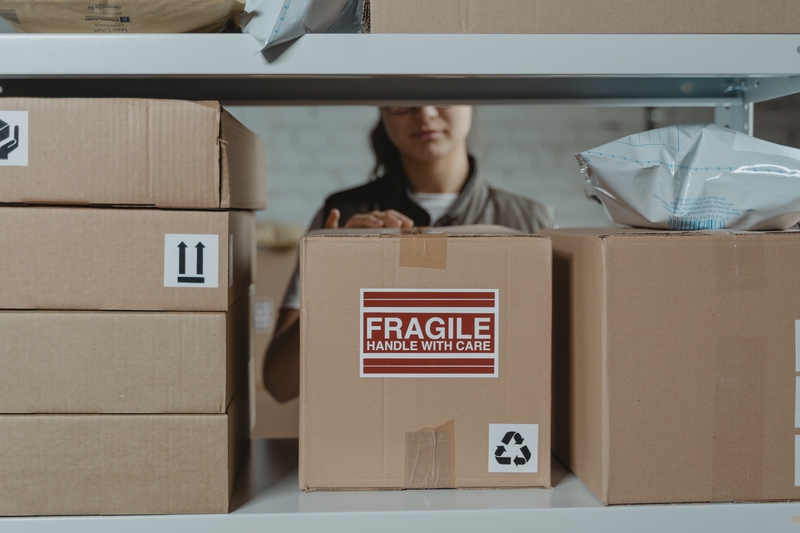
Photo: Tima Miroshnichenko/Pexels
Job Market
Package handling is an essential part of the supply chain industry, and the demand for package handlers remains steady. According to the Bureau of Labor Statistics, the employment of package handlers and warehouse workers is projected to grow 6% from 2021 to 2031, about as fast as the average for all occupations.
The growth of e-commerce has significantly increased the demand for package handlers in recent years, and this trend is expected to continue. With more people shopping online and having goods delivered directly to their homes, the need for package handlers in warehouses and distribution centers is on the rise.
Possibilities of Part Time Job and Remote Job
Part-time jobs are often available for package handlers, particularly during the holiday season when there is a surge in demand for package delivery. Part-time workers may have flexible schedules, which can be appealing for students, retirees, or those seeking additional income.
Remote jobs for package handlers are rare, as the job requires physical labor and the handling of packages in a warehouse or distribution center. However, some companies may offer remote positions for related roles, such as logistics or inventory management, which can be performed remotely using computer systems and technology.
Job satisfaction
Package handling can be a physically demanding and repetitive job, but it can also offer several advantages and disadvantages in terms of job satisfaction.
Advantages | Disadvantages |
Physical activity can provide health benefits | Repetitive tasks can be monotonous and lead to boredom |
Potential for flexible work schedules | Work can be physically demanding and lead to fatigue or injury |
Opportunities for career advancement within the company | May be required to work in less-than-ideal weather conditions |
Job security in a growing industry | May require working night, weekend, or holiday shifts |
Can work in a team-oriented environment | May need to lift heavy objects or operate machinery, which can be dangerous if not done properly |
Opportunities to learn new skills and gain experience in the logistics industry | May need to work in a noisy or busy environment, which can be stressful |
Government Program
There are several government programs and initiatives that may be relevant to individuals working as package handlers or warehouse workers. Some of these include:
- Trade Adjustment Assistance (TAA): This program provides assistance to workers who have lost their jobs due to increased imports or shifts in production outside of the United States. Eligible workers may receive training and education, job search and relocation allowances, and other support services.
- Workforce Innovation and Opportunity Act (WIOA): This program provides funding for workforce development activities, including job training, education, and career services. Individuals who are interested in advancing their careers or transitioning to a new field may be eligible for WIOA-funded programs and services.
- Occupational Safety and Health Administration (OSHA): This federal agency is responsible for setting and enforcing workplace safety and health standards. Package handlers and warehouse workers may be eligible for OSHA training programs and may benefit from knowing their rights and responsibilities under OSHA regulations.
- Department of Labor (DOL) Employment and Training Administration (ETA): This agency provides resources and support to job seekers, including information on training programs, job search tools, and career counseling services. The ETA also administers several programs that provide financial assistance to individuals who have lost their jobs or who are experiencing economic hardship.
- Apprenticeship.gov: This website provides information on registered apprenticeship programs across a variety of industries, including logistics and transportation. Apprenticeships provide on-the-job training and education, and may lead to higher-paying jobs and career advancement opportunities.
Overall, individuals working as package handlers or warehouse workers may benefit from exploring these and other government programs and initiatives to help them advance their careers, improve their skills, and achieve their professional goals.
- Package handlers are responsible for loading and unloading trucks, scanning packages, sorting them by destination, and moving them to the appropriate location for shipping.
- Package handlers need to have physical stamina, attention to detail, communication skills, and time management skills to be successful in this role.
- Factors such as location, experience, and employer can all influence earnings, but there are steps that can be taken to improve pay and benefits.
- Individuals can develop their careers by gaining experience, pursuing education and training, seeking out mentors, and specializing in a specific area.
- There are several government programs and initiatives for package handlers, including trade adjustment assistance, the Workforce Innovation and Opportunity Act, OSHA, the Department of Labor's Employment and Training Administration, and Apprenticeship.gov.
- Commercial Driver's License (CDL) and Hazmat Endorsement may be required for package handlers who operate commercial motor vehicles or handle hazardous materials.
FAQ
What is a package handler?
A package handler is a worker who is responsible for receiving, processing, and shipping packages in a warehouse or distribution center.
What qualifications are required to become a package handler?
No formal education or prior experience is required to become a package handler. However, candidates should be physically fit, able to lift heavy objects, and comfortable working in a fast-paced environment.
What is the work schedule like for a package handler?
Some package handlers work part-time or full-time shifts during the day, while others work overnight or on weekends.
What tools and equipment do package handlers use?
Package handlers use a variety of tools and equipment, including forklifts, pallet jacks, hand trucks, and scanners.
What are the career advancement opportunities for package handlers?
Package handlers may have opportunities for career advancement within the logistics and supply chain industry, such as becoming a supervisor or manager.
What benefits do package handlers typically receive?
Benefits for package handlers can vary depending on the employer, but may include health insurance, retirement savings plans, and paid time off.
What are some challenges that package handlers may face?
Package handling can be physically demanding and requires workers to be on their feet for extended periods of time. Additionally, working in a warehouse environment can be noisy and potentially hazardous, so workers must follow safety protocols and wear appropriate protective gear.